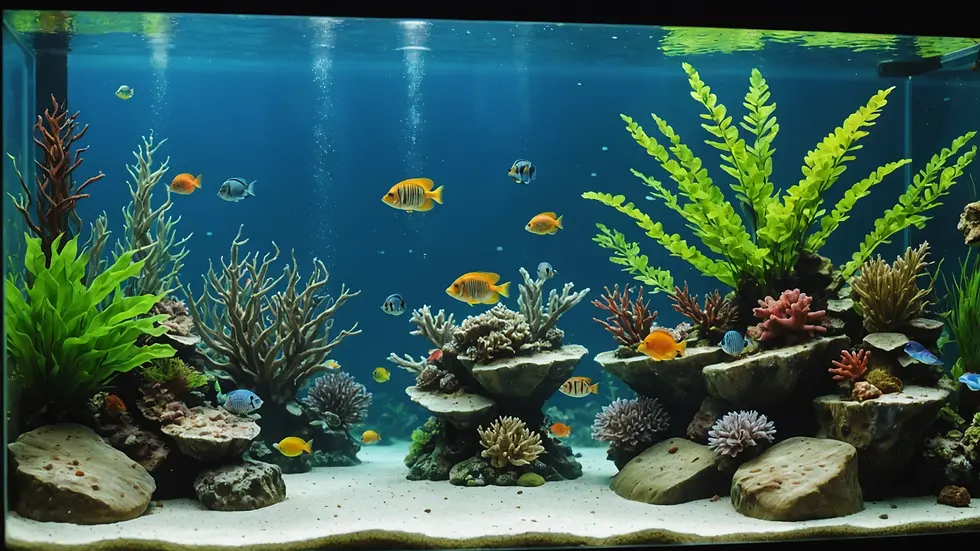Troubleshooting Tips: When Your Fish Suddenly Loses Its Appetite
- Jyotiraj Borah
- Feb 5
- 4 min read
When your beloved fish suddenly refuses to eat, it can be a worrying situation. Fish are generally consistent feeders, and any change in appetite should not be overlooked. There are many reasons for this, from environmental factors to health issues. Acting quickly is important to keep your fish healthy and happy. This guide will equip you with practical tips for troubleshooting your fish's loss of appetite and provide actionable steps for addressing the situation effectively.
Understanding Fish Appetite
While fish typically maintain stable feeding habits, various elements can influence their appetite. Factors like water temperature, water quality, stress, and health can dramatically affect whether your fish feels like eating. Paying close attention to these aspects can lead to useful insights.
Water Quality
Maintaining excellent water quality is critical for your fish's health. Poor water conditions can lead to stress and health concerns, which are common causes of appetite loss. Regularly testing your aquarium water is essential, focusing on key parameters such as pH, ammonia (ideally below 0.02 mg/L), nitrites (ideally at 0 mg/L), and nitrates (ideally below 20 mg/L).
If water quality is lacking, corrective actions may include:
Performing partial water changes (about 10-15% weekly).
Adding an additional filter if the current system isn't efficient.
Using water conditioners specifically designed for your fish species.

Stress Factors
Fish are sensitive creatures and can react negatively to environmental stressors. Changes like abrupt temperature shifts, bullying from tank mates, or excessive noise can affect their well-being and feeding habits.
If your fish seems anxious or often hides, it likely experiences stress. To alleviate this, consider:
Assessing the tank environment to remove aggressive species.
Providing plenty of hiding spots and plants.
Ensuring stable water temperature within the recommended range for your fish.
Temperature Fluctuations
Temperature is crucial for your fish's metabolism. Different species thrive at unique optimal temperatures, usually specified in care guidelines. A sudden temperature change, whether a drop below 75°F or a rise above 82°F, can cause your fish to stop eating.
Utilizing a reliable aquarium heater and thermometer can help maintain a stable environment. If temperature variations are suspected, correct them immediately to avoid severe health consequences.

Health Issues
Sometimes, a lost appetite is a sign of underlying health problems. Common health issues include fin rot or ich, which can impact feeding habits. Check your fish for indicators of illness, such as abnormal swimming, faded colors, or visible lesions.
If you notice any symptoms, consult a veterinarian specializing in aquatic animals promptly. Early detection is vital for effective treatment.
Feeding Habits
The reason behind a fish's reluctance to eat may simply be related to feeding habits. Overfeeding can cloud the water and create unhealthy conditions, leading to a lack of appetite.
To address this:
Ensure you are feeding the correct amount based on your fish's size and species, usually about 2-3% of their body weight daily.
Offer a balanced diet with a mix of fish flakes, pellets, and occasional live or frozen foods to keep their interest high.
Ageing Fish
As fish mature, their dietary needs change. Older fish often become less active, leading to decreased appetite. If you suspect your fish is aging, research specific needs for older fish.
Switching to specialized senior fish food packed with beneficial nutrients might rekindle their interest in eating. Regularly monitor their behavior and health to ensure comfort.
Seasonal Changes
Outdoor aquariums and ponds are particularly affected by seasonal changes. During winter, fish metabolism naturally slows down, resulting in decreased appetite. As a precaution, make sure the water temperature remains stable to avoid stress.
Adapting feeding schedules or providing appropriate shelter can help your fish thrive during these seasonal transitions.
Signs Your Fish May Be Sick
Early identification of illness is crucial for your fish's health. Some key signs include:
Lethargy: If your fish appears inactive and uninterested in swimming.
Abnormal Swimming: Erratic patterns may indicate health issues.
Visible Symptoms: Look for bruising, lesions, or any color changes.
Unusual Breathing Patterns: Rapid gill movement or gasping can signal distress.
What to Do If You Suspect Illness
If you notice these symptoms, isolate the affected fish in a hospital tank. This helps prevent illness from spreading and allows you to closely monitor their condition. Consult a veterinarian or fish expert for a proper diagnosis.
Treatment could include dietary adjustments, medication, or changes to water quality.
When to Seek Professional Help
If your fish's appetite remains unchanged despite your efforts, seeking professional guidance is essential.
Find a veterinarian experienced in aquatic animals or visit your local fish store for specific advice based on your fish's behavior and living conditions. Specialists can recommend appropriate tests or treatments tailored to your fish’s needs.
Long-term Health Monitoring
Once your fish starts to feed again, continue being vigilant about their health. Keep an eye on water quality and feeding patterns, and consider maintaining a journal to track any notable changes.
Bringing Back the Joy of Feeding
Addressing a loss of appetite can be very rewarding and enhance your aquarium experience. Once your fish is healthy and happy, consider new feeding techniques to make mealtimes exciting. You might introduce feeding toys or scatter food around the tank to mimic natural foraging.
By making feeding engaging, your fish is more likely to regain interest in mealtime.
Final Thoughts
A sudden drop in appetite can be alarming for any fish owner. By investigating potential causes such as water quality, environmental stress, health issues, feeding habits, and temperature fluctuations, you can form a clear plan to help your fish recover its appetite.
Should the issue persist after your diligent efforts, do not hesitate to seek professional help. Remember, your fish's health relies on your continued commitment to providing a stable and nourishing environment.
With patience and careful attention to detail, you can help your fish return to soon anticipating mealtime with joy. By fostering a vibrant and safe habitat, you will likely see positive changes in their feeding habits. Your aquatic companions deserve the best care, and with a little love, they can resume their healthy eating routines in no time.




Comments